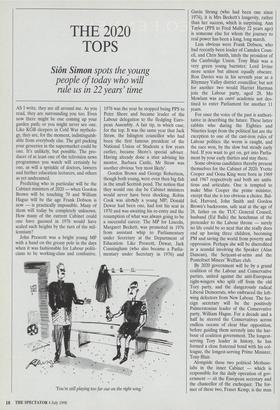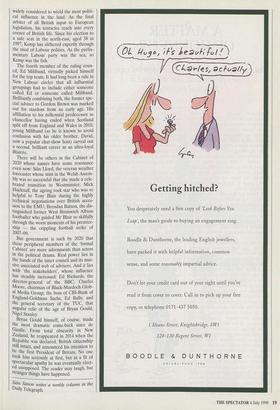THE 2020 TOPS
&On Simon spots the young
people of today who will rule us in 22 years' time
AS I write, they are all around me. As you read, they are surrounding you too. Even now there might be one coming up your garden path; or you might never see one. Like KGB sleepers in Cold War mytholo- gy, they are, for the moment, indistinguish- able from everybody else. The girl packing your groceries in the supermarket could be one. It's unlikely, but possible. The pro- ducer of at least one of the television news programmes you watch will certainly be one, as will a sprinkle of doctors, lawyers and further education lecturers, and others as yet undreamed.
Predicting who in particular will be the Cabinet ministers of 2020 — when Gordon Brown will be touching 70 and William Hague will be the age Frank Dobson is now — is practically impossible. Many of them will today be completely unknown. How many of the current Cabinet could one have guessed in 1976 would have scaled such heights by the turn of the mil- lennium?
John Prescott was a bright young MP with a hand on the greasy pole in the days when it was fashionable for Labour politi- cians to be working-class and combative. 1976 was the year he stopped being PPS to Peter Shore and became leader of the Labour delegation to the fledgling Euro- pean Assembly. A fair tip, in which case, for the top. It was the same year that Jack Straw, the Islington councillor who had been the first famous president of the National Union of Students a few years earlier, became Shore's special adviser. Having already done a stint advising his mentor, Barbara Castle, Mr Straw was another obvious 'boy most likely'.
Gordon Brown and George Robertson, though both young, were even then big fish in the small Scottish pond. The notion that they would one day be Cabinet ministers would never have been shocking. Robin Cook was already a young MP; Donald Dewar had been one, had lost his seat in 1970 and was awaiting his re-entry and the resumption of what was always going to be a successful career. The MP for Lincoln, Margaret Beckett, was promoted in 1976 from assistant whip to Parliamentary under Secretary at the Department of Education. Like Prescott, Dewar, Jack Cunningham (who also became a Parlia- mentary under Secretary in 1976) and `You're still playing too far out on the right wing.' Gavin Strang (who had been one since 1974), it is Mrs Beckett's longevity, rather than her success, which is surprising. Ann Taylor (PPS to Fred Mulley 22 years ago) is someone else for whom the journey to real power has been a long, long march.
Less obvious were Frank Dobson, who had recently been leader of Camden Coun- cil, and Chris Smith, lately the president of the Cambridge Union. Tony Blair was a very green young barrister; Lord Irvine more senior but almost equally obscure. Ron Davies was in his seventh year as a Rhymney Valley district councillor; but not for another two would Harriet Harman join the Labour party, aged 28. Mo Mowlam was an outré academic not des- tined to enter Parliament for another 11 years.
For once the voice of the past is authori- tative in describing the future. These latter rabbits who during the Eighties and Nineties leapt from the political hat are the exception to one of the cast-iron rules of Labour politics: the worm is caught, and the race won, by the slow but steady early bird. If you want to get on, get into Parlia- ment by your early thirties and stay there.
Some obvious candidates thereby present themselves for the Cabinet of 2020: Yvette Cooper and Oona King were born in 1969 and 1967 respectively and both are ambi- tious and articulate. One is tempted to make Miss Cooper the prime minister, except that she is too obvious a choice. Bal- liol, Harvard, John Smith and Gordon Brown's backrooms, safe seat at the age of 28, father on the TUC General Council, husband (Ed Balls) the henchman of the pretender to the Labour throne — surely no life could be so neat that she really does end up having three children, becoming PM and saving the world from poverty and oppression. Perhaps she will be discredited in a scandal involving the Speaker (Alan Duncan), the Serjeant-at-arms and the Pontefract Miners' Welfare club.
By 2020 government will be by a grand coalition of the Labour and Conservative parties, united against the anti-European right-wingers who split off from the old Tory party, and the dangerously radical Liberal Democrats, who embraced the left- wing defectors from New Labour. The for- eign secretary will be the positively Palmerstonian leader of the Conservative party, William Hague. For a decade and a half he steered the Conservatives across endless oceans of clear blue opposition, before guiding them serenely into the har- bour of coalition government. The longest- serving Tory leader in history, he has formed a close fraternal bond with his col- league, the longest-serving Prime Minister, Tony Blair.
Alongside these two political Methuse- lahs in the inner Cabinet — which is responsible for the daily operation of gov- ernment — sit the European secretary and the chancellor of the exchequer. The for- mer of these two, Fraser Kemp, is the man widely considered to wield the most politi- cal influence in the land. As the final arbiter of all British input to European legislation, his tentacles reach into every corner of British life. Since his election to a safe seat in the north-east, aged 38 in 1997, Kemp has slithered expertly through the mud of Labour politics. As the parlia- mentary Labour party was the sea, so Kemp was the fish.
The fourth member of the ruling coun- cil, Ed Miliband, virtually picked himself for the top team. It had long been a rule in New Labour circles that all influential groupings had to include either someone called Ed or someone called Miliband.
Brilliantly combining both, the former spe- cial adviser to Gordon Brown was marked out for stardom from an early age. His affiliation to his millennial predecessor as chancellor having ended when Scotland split off from England and Wales in 2010, young Miliband (as he is known to avoid confusion with his older brother, David, now a popular chat-show host) carved out a second, brilliant career as an ultra-loyal Blairite.
There will be others in the Cabinet of 2020 whose names have some resonance even now: Sian Lloyd, the veteran weather forecaster whose stint in the Welsh Assem- bly was so successful that she made a cele- brated transition to Westminster; Mick Hucknall, the ageing rock star who was so helpful to Tony Blair during the highly technical negotiations over British acces- sion to the EMU; Brendan Batson, the dis- tinguished former West Bromwich Albion footballer who guided Mr Blair so skilfully through the worst moments of his premier- ship — the crippling football strike of 2007-09.
But government is such by 2020 that these peripheral members of the 'formal Cabinet' are more adornments than actors in the political drama. Real power lies in the hands of the inner council and its mas- sive associated web of advisers. And it lies with 'the stakeholders', whose influence has steadily increased: Ed Richards, the director-general of the BBC; Charles Moore, chairman of Black-Murdoch Glob- al Media Group; the boss of CBI-Bank of England-Goldman Sachs, Ed Balls; and the general secretary of the TUC, that angular relic of the age of Bryan Gould, Nigel Stanley. Bryan Gould himself, of course, made the most dramatic come-back since de Gaulle. From total obscurity in New Zealand, he reappeared in 2014 when the Republic was declared, British citizenship still intact, and announced his intention to be the first President of Britain. No one took him seriously at first, but in a fit of spectacular apathy he was eventually elect- ed unopposed. The reader may laugh, but stranger things have happened.
Sion Simon writes a weekly column in the Daily Telegraph















































































































 Previous page
Previous page